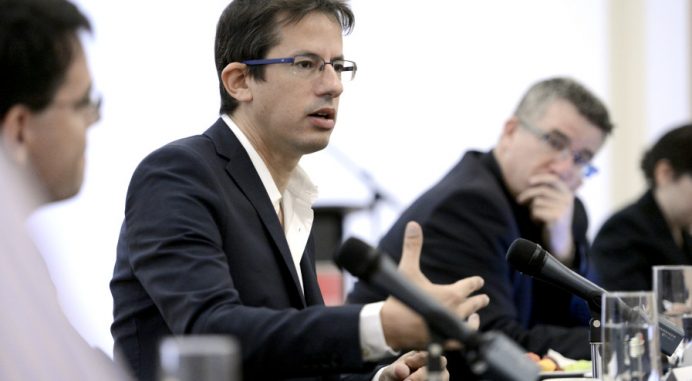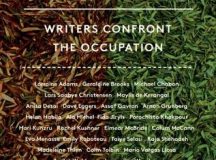Hagai El-Ad is the Executive Director of B’Tselem – The Israeli Information Center for Human Rights in the Occupied Territories. Alan Johnson is the editor of Fathom. The pair sat down earlier this year for an in-depth discussion. What does El-Ad think has been the impact of the occupation not just on the Palestinians but on Israeli democracy and society? Why does B’Tselem insist that the occupation is a human rights issue? How does he understand the relationship between politics and human rights? How does he respond to the storm of criticism of B’Tselem from the Israeli Right? Why did he decide to make a speech against Israeli settlement policy to the UN in 2016, prompting the Israeli prime minister to say he had joined the ‘chorus of mudslinging’ against Israel? What is B’Tselem’s report card on Israeli democracy?
B’Tselem
Alan Johnson: What is B’Tselem and what does it do?
Hagai El-Ad: We’ve been around for close to 30 years. We are an NGO that documents, researches, advocates and campaigns on issues relating to human rights in the occupied territories – the West Bank, Gaza and East Jerusalem.
Occupation and Israel
AJ: You have written ‘I was born in Israel when the occupation was two years old. It is still here more than four decades later.’ Clearly, the occupation is the central fact in the lives of the Palestinians and we will talk about that. But what difference has the occupation made to Israel and Israelis?
HE-A: We each have a moral responsibility for this reality as Israelis. And as you say, I’ve lived all my life alongside this reality. One thing that weighed heavy on my shoulders when I decided to move from the Association for Civil Rights in Israel (ACRI) to B’Tselem was the sense that I may live a very long and good life and all of it will be spent in the shadow of the occupation. That’s something that I could not have even imagined when I was younger. So, first it is a question of moral responsibility: what have I done to negate the perpetuation of this reality?
In addition to all the horrible things we are doing to Palestinians, you cannot sustain a military occupation of an entire people for half a century and there not be consequences within the Green Line. First of all, our thinking about human rights in Israeli society has been catastrophically damaged. Because most of the violations are against Palestinians, most of our energy is devoted to protecting the rights of Palestinians, the prime victim of this reality. So in the minds of many Israelis, ‘supporting human rights’ means supporting the Palestinians, who are frequently perceived as ‘the enemy’. And when there is an equation between supporting human rights and supporting the enemy, it has consequences for Israel proper, of course.
Take the anti-democratic legislation. For example, we passed a law preventing entry into Israel by people who support boycotts. Of course, boycotts only have traction in the context of the occupation. I am now a citizen of a country that has passed a law that filters internationals that want to come to my country and its occupied territories, based on their political position! Look, regardless of what you think of boycotts, they are a non-violent expression of free speech. That law is both inspired by the non-democratic reality of the occupation, and is meant to perpetuate the occupation. So we are paying the price, day in and day out.
The Regulation Bill
AJ: We hosted Oded Haklai at a Fathom Forum in April. An Israeli, now an academic in Canada, he has researched Israeli public opinion about the settlements. His data shows that the younger an Israeli is, the less likely they are to ‘see’ the Green Line, i.e. to understand that there is an occupation, or to know that the settlements do not belong to the territory of the State of Israel. Haklai told us that, as a Zionist, the Regulation Bill was ‘a game changer’ for him. President Reuven Rivlin issued his own warning about how the world will see Israel if that bill is not struck down by the Supreme Court. Benny Begin called it the ‘Theft Law’. What is B’Tselem’s analysis of the meaning of this development? You are opposed to the bill, of course, but what was its political meaning? Was it a temporary answer to the political problems of coalition management created by the Supreme Court mandated evacuation of the Amona settlement? Was it an act of grandstanding to win votes on the Right? A serious step towards annexationism?
HE-A: Of course all the settlements are illegal. The so-called ‘illegal outposts’ were not built with official Israeli government approval, although many have been built, sustained, nourished, protected and developed by the government turning a blind eye or supporting the settlement enterprise over or under the table. The distinction between ‘legal’ and ‘illegal’ settlements is not convincing, either legally or formally, but that’s the language in which these issues are discussed in Israel.
The Regulation Bill was passed because it was discovered that some Israeli settlement structures had been built on privately owned and registered Palestinian land. The bill claims to legalise those structures, but it is basically theft of other peoples’ property. The other people happen to be Palestinian. They already had very limited rights, of course, but this next step, removing their property rights, was too much for Israel’s High Court of Justice to swallow. So, in a number of cases – Amona was the most discussed – the High Court ordered the government to remove those ‘illegal’ settlement structures and evict the thieves. Of course, there was then postponement after postponement after postponement, and years went by. Eventually, the Amona residents were evicted. And this caused a lot of political friction, on the Right, in Israel, resulting in this Regulation Law being passed. It allows the retroactive transfer of ‘usage rights’ not ownership – the double speak is just so transparent!
B’Tselem’s take? You know, we are not that impressed. Of course, it’s repugnant and ridiculous, but it is completely consistent with everything we have been doing to Palestinians over the last half-century. And in that sense one really has to pause and to question this outrage, in the following sense. Let’s imagine that we go back in time a few short months before this law was passed? Do we reach the ‘good old days’? No! In those ‘good old days’ we were taking over Palestinian land across the board in all of the ways that have been legalised, or approved (or ignored – so that they can go ahead) by the High Court and the government. Mostly, it’s done through the mechanism of announcing the establishment of what is called ‘state land’. (Of course in Palestine, ‘state land’ is Israeli – that’s the way we have structured that.) And there are other mechanisms: military training zones, nature reserves, ‘prevention of Master Plans,’ and so on. All these mechanisms are well known and have been used openly and officially for 50 years. And so what, that is somehow acceptable to you, but the Regulation Bill is not? The moment you add a dash of privately owned land – it’s a very small percentage – to this ocean of public Palestinian land that we stolen, what, that is what pushes you over the top?
We should have all been outraged earlier. If we are to have intellectual coherence about our own reality then let’s be honest: it’s not just this law that is an outrage. It has been the mainstream policies of Israeli governments, Left, Centre and Right – and I stress, governments, not a bunch of settlers – going back half a century, that have brought us to this reality.
Politics and human rights
AJ: You sounded very political in that answer. B’Tselem has been criticised for mixing up politics and human rights. For example, NGO Monitor criticised B’Tselem for hiding a ‘partisan, political agenda under the façade of human rights’. A page at the NGO Monitor website is titled ‘Political, Ideological Approach of Hagai El-Ad at B’Tselem’. How do you respond to those kind of attacks? For you, what is the relationship between politics and human rights?
HE-A: First of all, human rights are political in nature. They deal with controversial aspects of the reality in a society. They are not partisan, but they have this complex relationship with reality. B’Tselem has been, is, and will remain a human rights organisation. It is exactly out of that commitment to the realisation of human rights that we have been making these statements and taking these positions. We think – and this is key to our analysis of the situation – that we are not in day one, week one, month one, year one or even decade one of this reality. We are 50 years into a situation in which we control millions of people under military rule with almost no rights and somehow my country is getting away with it, still considered a western democracy. That’s what we are facing.
So from a human rights perspective one can’t avoid the question, ‘How do we bring about an end to the occupation?’ It is a no-brainer that under this reality there will never be a realisation of the human rights of Palestinians. The only way that this can happen is through an end to the occupation. The occupation can end in a variety of ways and that’s not something that we take a position on, because that is not a human rights question.
We can critique any specific solution that is suggested, judging whether or not it is compatible with safeguarding the rights of Palestinians and Israelis. But we are not advocating for a two-state solution, a one-state solution, a five-state solution, and so on. That’s not our business. But ending the occupation is a human rights priority. I actually think that it is fair to ask those who avoid drawing that conclusion, how is their avoidance compatible with a commitment to the realisation of human rights?
AJ: You say you don’t take a position on two states. How would you respond to a person who said, ‘hold on, human rights include the right to national self-determination. For both Israelis and Palestinians, the only way to fulfil that right is through creating two states for two peoples, so to be for two states is a kind of human rights question’? Surely the problem with the so-called one-state solution, whether in its right-wing or left-wing version, is that it denies that right to national self-determination, for both peoples?
HE-A: I think self-determination certainly is a human right, a collective human right, but of course collectives can make various decisions about the way they want to express that right in reality.
In practice, there is no expiration date for this temporary belligerent occupation. Is 50 years temporary? Is the accumulation of settlements temporary? Give me a break, right? No one would take that seriously. So our position is that what we are faced with is the following situation – there are 13 million people who are living under Israeli control between the Jordan River and the Mediterranean Sea to one degree or another: external control in Gaza, Area A, Area B, Area C in the West Bank, annexation in East Jerusalem, and of course the Israeli population, both Jewish and Arab, within the Green Line. And the only future that is compatible with human rights is one that is based on political rights for everyone, dignity, democracy, and so on. Perpetual occupation is not compatible with human rights.
B’Tselem’s ‘Hitching a Ride’ campaign
AJ: NGO Monitor was very critical of the 2014 ‘Hitching a Ride’ campaign in which B’Tselem argued that Israel’s military operation to locate and rescue the three kidnapped Israeli Jewish teenagers and weaken the Palestinian terror infrastructure in the West Bank was – these are B’Tselem’s words – a case of Israel ‘cynically exploiting the deep concern for the abducted teens’ to ‘implement sweeping actions which intensify harm to the human rights of Palestinians’. NGO Monitor fired back, accusing your organisation of ‘profound insensitivity to the victims’ families, a refusal to recognise the inherent legitimacy and legality of Israel’s military operation and tactics, and an apparent disregard for Israeli public opinion’. How would you respond to that criticism of B’Tselem?
HE-A: It’s not that exceptional that NGO Monitor is going after B’Tselem and other human rights organisations. To what extent NGO Monitor is a genuine voice critiquing NGOs in Israeli society is an interesting question, maybe beyond the scope of this interview. I think it would be telling to ask if NGO Monitor is interested in any other NGOs, inspecting their activities and so on, besides those NGOs working against the occupation. I also think it is important to take a step back and to say a few words about the atmosphere in Israel. Israeli human rights organisations, especially ones working on this issue, have for a number of years faced everything from government intimidation to harassment to hostile legislation. Barring entry of internationals to Israel, based on their political opinions, that is only the international part of a process that is already underway in Israel proper. The affront to democracy isn’t just that Palestinians do not have a vote to determine their future (whereas when we Israelis vote, we vote to determine our future and their future). It is also that in a democracy, civil society organisations are not supposed to be intimidated or legislated against by the government, or by government surrogates.
B’Tselem at the UN
AJ: At the UN Security Council (UNSC) in 2016 you addressed a special discussion about settlements. Your speech ended thus: ‘Fifty years of “temporary” occupation are too long for even a single person on this planet to accept such a contradiction in terms. The rights of Palestinians must be realised; the occupation must end; the UNSC must act; and the time is now.’ There was a storm of criticism in Israel. There was also praise: Haaretz said that the speech should be the updated platform of ‘the opposition we lack’. Why did you go to the UN given the reaction you must have anticipated? Were you conflicted, given the human rights record of many in your audience? Tell us about your thinking.
HE-A: We came to a realisation a while ago – and the UN speech was only the most public expression of this realisation – that there is a very limited set of options. Given we are absolutely committed to non-violence, and given what is going on, when you try to identify non-violent ways out of this reality, ways to avoid another 10, 50, or 100 years of more of the same – what people call ‘the status quo’ but it’s not a status quo because it’s progressing all the time in one direction – then the options are very limited.
We advocate first and foremost to the Israeli public. Using credible sources we say ‘this is the reality’. We have been doing that for close to 30 years. After such a long time, you have to ask yourself: ‘If we only do more of the same, will we ourselves become part of this status quo, or can we do something that will really make a difference?’ When B’Tselem was founded the intent wasn’t that we would celebrate 50 years of the organisation. We want to go out of business. This occupation needs to end. It was presented to the Israeli public as temporary. It was presented to the world as temporary. And here we are, into the 50th anniversary of the occupation.
In the absence of international action it is very difficult to see anything else than can inform the thinking of Israelis and Palestinians and usher in a different future. We pick very carefully the international stages from which we make statements. The UNSC is the most important international body responsible for peace and security on the planet and we think it is a very appropriate venue, giving us a chance to be heard not just by the members of the council but by Israelis and Palestinians and by a global audience.
AJ: So, your decision signalled a shift from trying to convince Israelis from within to trying to pressure Israel from outside? I guess there is not a yes/no answer to that question, but can you tell us your thinking about the balance that should be struck between those two approaches? Also, you argued shortly after the speech that ‘the reality will not change if the world does not intervene’. What does ‘intervention’ look like to you? What would be the agencies and modalities of that ‘intervention’? How would it bring the parties together not push them further apart?
HE-A: First, I want to agree with you – we don’t think it is a zero-sum game. It’s not an either / or question. As I’ve said before, our commitment to continue advocating to the Israeli public is not going to change. We are actually putting more resources into engaging Israelis. And in fact, my speech in New York to the UNSC resonated very strongly in Tel Aviv, Jerusalem, Haifa, Sderot, Beersheva and across Israel. When you speak globally you are heard locally, and sometimes the other way around. And of course the international context helps to form the decision making of Israelis. It’s not that we are going to give up on that domestic aspect of what we do. It was always essential and will remain so. It’s just not sufficient to bring about change.
I draw a distinction between statements and action. A prime example of the way that most statements don’t make a difference was that 2016 was the best year on record in terms of international statements against the demolishing of Palestinian homes on the West Bank, and the worst year on record in terms of demolitions. There were more Palestinian homes destroyed that year than in 2014 and 2015 combined. The Israeli government doesn’t care about statements. Statements coexist extremely well with demolitions. More language, more statements are just going to usher in the next half century of the occupation. We want something different.
AJ: Boycotts are one mode of outside intervention favoured by some people. What is your opinion about the Boycott, Divestment and Sanctions (BDS) movement?
HE-A: As an organisation we don’t have a position. Most of our messaging is tailored for governments because they have responsibility. We think they are betraying that responsibility through their lack of action and their acquiescence with this reality. The one thing I will say about BDS is that it is a non-violent form of free speech. And the laws that have passed in Israel as a response to BDS – one in 2011 and one in 2017 – we think are completely inconsistent with basic democratic principles. The 2011 law – which makes you susceptible for civil litigation for damages if you support boycotts – was appealed to the High Court in Israel but it refused to intervene, even though the law is completely inconsistent with the basic principles of free speech. I think it is a no-brainer as a legal question.
Israelis, like people the world over, support boycotts; whether it be against factories damaging the environment or stores that are open on the Jewish Sabbath, or any number of other reasons. And that is all acceptable; no one could sustain a lawsuit in those cases. The single issue on which Israelis are open to such litigation is when they engage in the effective boycott of settlement goods. And that is not just the law. It is the law that was backed by the High Court.
Our sense in B’Tselem is that, so far, Israel has been allowed to have it both ways. We have been allowed to run a military occupation of an entire people for half a century while at the same time to be considered internationally as a Western democracy with all the perks that go with that status. We think it is unacceptable that this is allowed to continue. We think it is improper and wrong and immoral that we have it both ways. And we think that therefore the question needs to be put before the Israeli public.
B’Tselem and the Palestinians
AJ: In an article for Haaretz you wrote, ‘What are the Palestinians supposed to do? If they dare demonstrate, it’s popular terror. If they call for sanctions, it’s economic terror. If they pursue legal means, it’s judicial terror. If they turn to the United Nations, it’s diplomatic terror.’ Let me put to you a certain kind of response to that, which I hear a lot. It would go something like this: ‘Isn’t that unbalanced? It implies that the Palestinians are blameless innocents. Are you not decontextualising the conflict because what you won’t talk about is Palestinian rejectionism, maximalism, systemic incitement, hate education, terrorism, corruption, and authoritarianism? What about the fact that the Palestinians kicked out Salam Fayyad, the best nationalist state builder they had? What about the Hamas rockets? What about Mahmoud Abbas being in the 12th year of a four-year term? Isn’t it your silence as an organisation on all this that leads some on the centre Left to distance themselves from you? The sceptics feel you adopt a position of “the enemy is at home” rather than stand for the human rights of all, rather than be critical of all human rights abusers, all obstacles to peace?’ How do you respond to that kind of criticism?
HE-A: I certainly agree that it is not simple. It’s complex, yes, and both Israelis and Palestinians have agency, yes. Both have responsibility in this reality, no question. Having said that, it is correct to say it is not a balanced situation. These are not two equal sides that are freely negotiating with each other. The imbalance of power between Israelis and Palestinians is huge on all measures – not just militarily but also diplomatically, economically, and so on. This has to be factored in. Most of our critique, fairly and accurately, goes to the side that holds most of the power and is responsible for much – not all, but much – of this reality.
AJ: But someone might say, whenever Israel has withdrawn from an area in recent times – southern Lebanon, Gaza – rocket attacks, often Iranian sponsored, begin. And because of that they are extremely wary of simply getting out of the West Bank, the high ground above Israel’s narrow waist, Israeli population centres and airport. People fear a terror threat from the West Bank if the IDF simply walks out. I think people have an issue with B’Tselem because they feel that they do not hear that complexity being reflected in what you say and do. They feel that your speech at the UN would have been better had it acknowledged some of that complexity and the difficulty of moving forward for those Israelis who do want to move forward. Do you have any sympathy with that view?
HE-A: It’s difficult for me to take that argument seriously. It’s not about messaging in a way that is more digestible. I think that speaking truth to ourselves, and to the rest of the world is the one thing that will make a difference. The one thing that is going to make a difference, in a non-violent way, is international action. The situation is so brutal, and it has been going on for such a long time, that we are way beyond the point where its about making the message digestible.
AJ: But human rights are important to Israelis, and a lot of Israelis see the deep problems a military occupation causes to a civilian population. But a lot of Israelis also don’t see the occupation in a vacuum – there’s a reason why it started and many reasons why it is continuing – and while some of those may be due to Israeli intransigence, others are down to Israeli security concerns and Palestinian historical and current rejectionism. Is it possible that talking solely about the human rights of Palestinians in this context just isn’t politically convincing. Maybe it should be. But it isn’t. Are B’Tselem more interested in being right than being smart? How do they hope to influence Israelis by this strategy?
HE-A: You mention the word ‘security’. That is the moment at which everyone is supposed to salute, become silent and say, ‘oh, of course, security’. Well, if you probe under the surface of this discourse you will discover that over the last 50 years we’ve used security excuses day on and day out in order to advance what are seen as Israeli interests over the interests of the Palestinians. I am not saying that there are no valid security concerns. Of course there are. Absolutely. However, first, we are very far from that point, and second, what does the theft of Palestinians land have to do with security?
In theory, we could have had a situation in which there were no settlements, and a ‘proper’ military occupation until a political resolution of the situation. In that situation it would be a matter of working out how the Israeli army and the Israeli occupying authorities should conduct themselves in relation to the occupied civilian population in the meantime, right? And even if we were in that scenario, after such a long time there would still be the question of political rights and the ability of people to take decisions with regards to their own future. But what I have just described has nothing to do with the reality for Palestinians in the West Bank and in East Jerusalem. What’s the relationship between the treatment of Palestinians in East Jerusalem – lack of classrooms, to take just one example – and security? Nothing! And there are a million such examples. Security is invoked as a convenient excuse. Eventually, this undermines the genuine security concerns. If 80 per cent is nonsense it damns the credibility of the remainder which is meaningful.
B’Tselem and the Israeli opposition
AJ: How do you see B’Tselem’s relationship with the Israeli opposition parties? Yair Lapid has attacked B’Tselem and I think I’m right that Isaac Herzog has pretty much ignored B’Tselem. How can B’Tselem have an impact on policy and legislation, if the opposition parties have this attitude?
HE-A: I think there is a question about the extent to which those parties actually are an opposition. If we use the future of the occupation as the test, as the way to place those parties on a political spectrum in Israel, then we can distinguish between those political parties that are content with one variation of another or the status quo for a significant time to come, and that is almost everyone, and two parties – Meretz and the Joint List – which are very committed to advocating for an alternative to the status quo. I think here the Israeli public is in a better place than the political leaderships. Our public opinion research demonstrates that there is a much bigger minority in Israeli society – a minority but still a significant one – that rejects the current reality but which is not properly represented in the Knesset.
For B’Tselem, which is non-partisan and not running for election, it’s not about popularity. It’s about the ability to call things as they are to the Israeli public. I think there is a lot of desire in Israeli society not to discuss this issue, and for it to remain a non-issue. But there were two moments in the last year when this issue – as despised and hated as it is – was discussed very broadly. One was after the video footage of the shooting of the Palestinian perpetrator by an Israeli soldier. He was caught on camera by a former volunteer of B’Tselem Video Project. And the other was my UN speech and, later, the passing of UNSC Resolution 2334. We are successful, as hated as we are by some, from the Prime Minister down; portrayed as a fifth column, a treasonous entity in the service of sinister foreign powers, and so on. Time and again we bring this issue into the living rooms of the Israeli public, even if people don’t want to see and don’t want to hear.
Even if you assumed for a second that all the lies they tell about us are true, what difference would it make? Tomorrow morning, 13 million people are still going to wake up to exactly the same reality, and here is the real question: what is the government’s plan with regards to the future?
Whither Israeli democracy?
AJ: If you were writing a report card on the state of Israeli democracy today, what would you write?
HE-A: We are in a bad spot and it’s getting worse. If you consider the illiberal and anti-democratic laws already passed and those in the pipeline, the space for Israeli democracy has been shrinking for a long time. Not just since the recent crop of laws but since 1967. In fact, the space has been shrinking for most of the time that my country has existed because we deny rights to an entire people. And we have been fine with that, for such a long time. So that is the major problem with Israeli democracy.
Having said that, we have also been seeing developments within Israel itself. I feel very strongly that you can not have this reality on one side of the Green Line and assume that it’s not going to have toxic effects on the other side of the Green Line, especially after 50 years. When I was director of ACRI there was a lively and important education department. Their deep sense of decency and the level of commitment to engaging with teenagers and encouraging them to value human rights always inspired me.
And you know, teenagers are not stupid. You can say all the right things in the classroom, but then they go out and they see reality as it is. They see the way we treat the Palestinians as less than equals, and that is a polite way of describing it. And they see that everyone is just fine with it. And everyone’s been just fine for as long as those teenagers have been alive, and as long as the previous generation has been alive. So ask yourself: why would they take human rights seriously when they see that our reality, in regards to millions of people, is completely the opposite? That has catastrophic implications for attitudes to human rights in Israeli society.
The recent crop of illiberal and anti-democratic laws in Israel are inspired by that non-democratic context because, you know, so the reasoning goes, if we do it to them, then why not do it to the people that are not ‘loyal,’ like myself and others who oppose this reality. And if we are a problem, then we need to be silenced. All of these laws are part of that process of silencing. These two things go hand in hand. And unless we end the occupation sooner rather than later, then, yes, first and foremost Palestinians will continue to pay a horrible price. But so will Israel proper.






































I was wondering if B’Tselem takes up the cases of Palestinians whose human rights are violated by Hamas and The Palestinian Authority?
In response to the comment from FELIX SHEPTON :
B’Tselem “documents, researches, advocates and campaigns on issues relating to human rights in the occupied territories – the West Bank, Gaza and East Jerusalem.” There are two common denominators in what was written and they are, Israel and human rights. The aim, therefore, of the NGO is to report on Israel and human rights violations and what Hamas or other bodies do is beyond their writ.
In response to Felix Shepton and Jonathan Gray: No B’Tselem does not take up the cases of Palestinians whose human rights are violated and that organization is unwilling to do so, which is exactly why Bassem Eid, a Palestinian, left B’Tselem as his desire to also report on human rights violations of Palestinians by the Palestinian governing bodies was not allowed by B’Tselem. Now he travels the world reporting on the human rights violations of Palestinians by Palestinians. But, unlike B’Tselem, he does not have the financial or political support of those European nations and European and non-European individuals to ensure that his voice is heard.